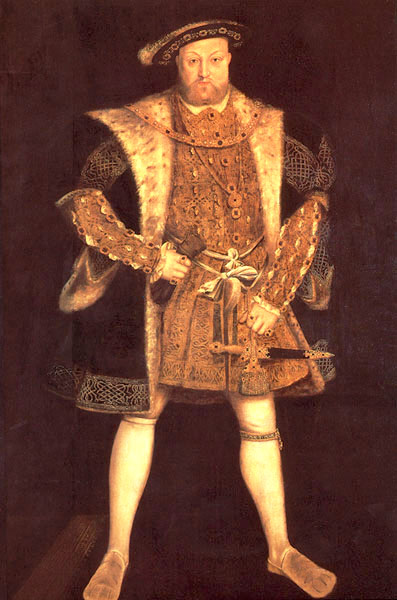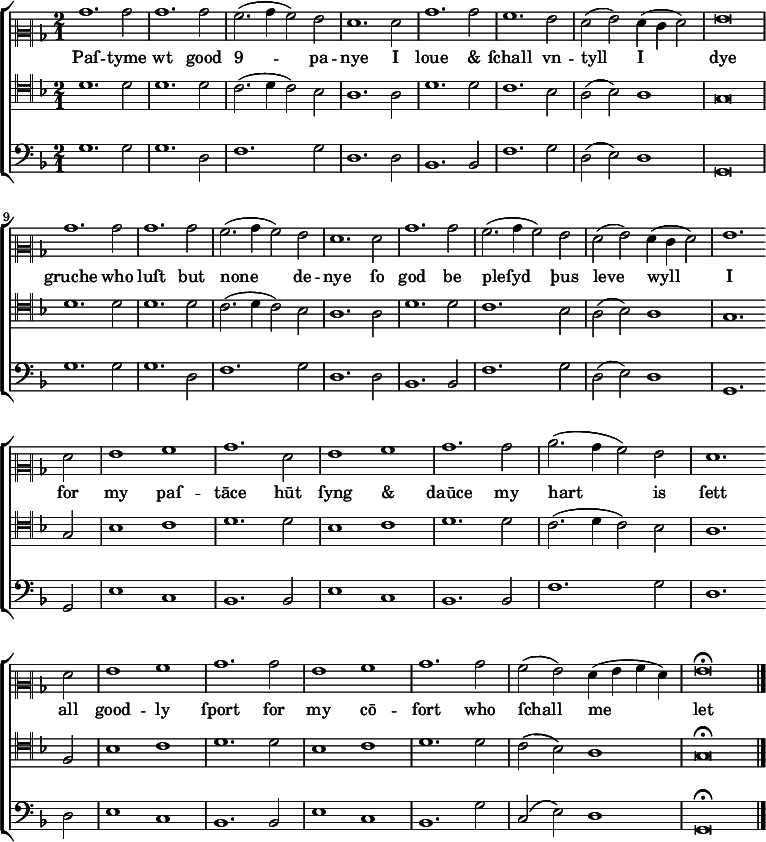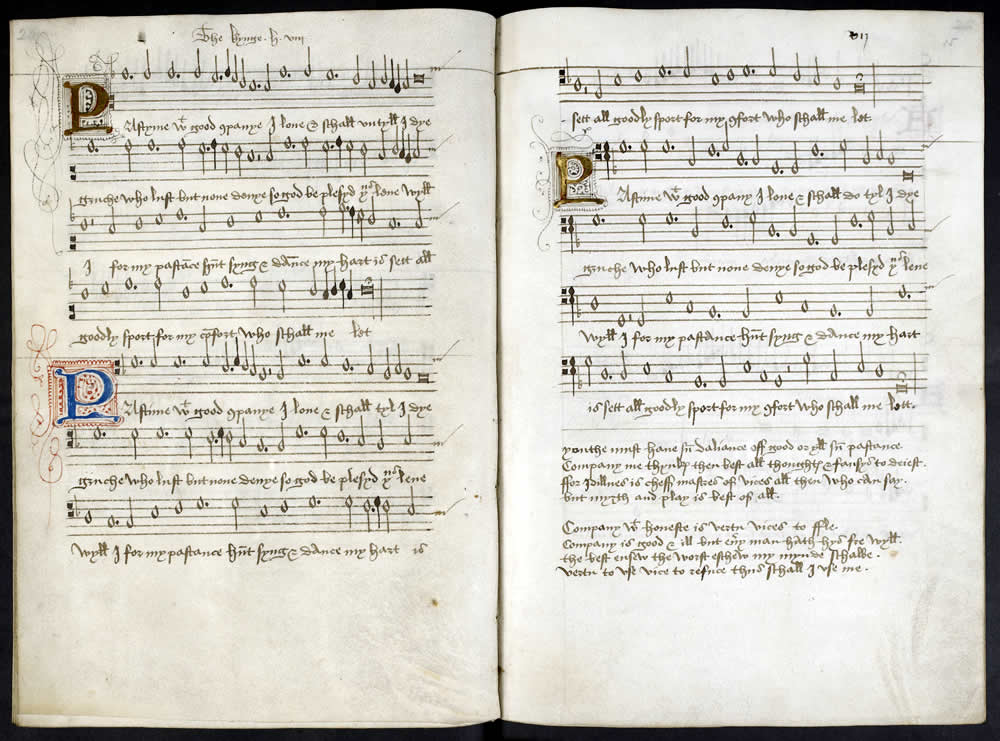|
Pastime With Good Company

"Pastime with Good Company",
also known as "The King's Ballad" ("The Kynges
Balade"), is an English folk song written by King
Henry VIII in the beginning of the 16th century,
shortly after his coronation. It is regarded as the
most famous of his compositions, and it became a
popular song in England and other European countries
during the Renaissance. It is thought to be written
for Catherine of Aragon.
Original score of Pastime with
Good Company (c. 1513), held in the British
Library, London.
Historical
context
The early years of Henry VIII's
reign marked a distinctive character of exuberance
and extravagances in the English court, made
possible by the political stability of the kingdom
and wealth of the state's finances. Royal banquets
and feasts were held on a continual basis, as were
outdoor sports and pastimes, such as hunting,
hawking, and jousting and archery tournaments. The
young King himself was a skilled sportsman,
excelling in horse riding, archery, wrestling and
real tennis. The song was penned during this period,
and presents a general praise to all these
entertainments and diversions, depicting the general
state of mind of leisure and unconcern that
prevailed in the royal court at the time. At the
same time, the text provides a moral justification
for all this merriment: company is preferable to
idleness; for the latter breeds vice.
 The
song
Eighteen-year-old King Henry VIII after his crowning
in 1509, around the date he composed Pastime with
Good Company. As with every man of
noble birth in Renaissance times, Henry VIII was
expected to master many skills, including fencing,
hunting, dancing, writing poetry, singing, and
playing and composing music, and was educated
accordingly as a prince. Henry was considered a
talented composer and poet by his contemporaries.
The song is supposed to have been played in court,
along with all the other of the King's
compositions.[However, due to its simple and catchy
melody, it became a popular tune and was soon
afterwards interpreted frequently at English fairs,
taverns and events. It is also believed to have been
one of the favourite musical pieces of Queen
Elizabeth I. The song is referred to in a number of
contemporary documents and publications, attesting
to its popularity, and was subject of a wide number
of variants and instrumental rearrangements by
different musicians in the following years. In the
1548 work The Complaynt of Scotland, the anonymous
author mentions "Passetyme with gude companye," as
being among the popular songs within the kingdom of
Scotland in the early part of the 16th century.
The oldest known version is part of the Henry VIII
Manuscript (c. 1513), a collection of 14 works of
his authorship currently preserved at the British
Library (BM Addl. MSS. 31,922; Addl. MSS. 5,665;
MSS. Reg. Appendix 58), which are signed: "By the
King's Hand". The manuscript also includes two
masses, a motet, an anthem, and other songs and
ballads, both vocal and instrumental.
"Pastime with Good Company" remains a favourite
piece in choral repertoires, and has been recorded
in many variants that include lute, recorder,
trombone, percussion and flute, among other
instruments. Because of its distinctive early
Renaissance melody, it has also been included in
different movies and documentaries based on the
figure of Henry VIII and the Tudor era.
The song was also subject of numerous contemporary
versions in recent times. Renamed as "Past Time with
Good Company", it was included as the third track on
Under a Violet Moon, the second album by
Renaissance-inspired folk rock group Blackmore's
Night. The song was also played by rock band Jethro
Tull, and appears on the remastered CD Stormwatch
and The Best of Acoustic Jethro Tull bearing the
name "King Henry's Madrigal". Additionally, the song
was arranged and played by English progressive/folk
rock band Gryphon, appearing on their 1973,
self-titled album. The first verse of the song was
also used as the opening to the song "Legacy of
Tudors" by symphonic metal band Serenity on their
2013 album War of Ages.
SOURCE
|
PASTIME
WITH GOOD COMPANY
|
Eighteen-year-old
King Henry VIII after his
crowning in 1509,around the
date he
composed Pastime with Good Company.
|
Pastime with good
company I love, and shall until I die;
Grudge who will but none deny so this
live will I
For my pastance, hunt sing and dance;
My heart is set,
All goodly sport, to my comfort, who
shall me let?
Youth must have some dalliance, of
good or ill some pastance;
Company me thinketh best allthoughts
and fancies to digest;
For idleness is chief mistress of
vices all:
Then who can say but mirth and play is
best of all?
Company with honesty is virtue sure;
and vice to flee,
Company is good or ill, but every man
has his free will.
The best I sue, the worst eschew; My
mind shall be
Virtue to use, vice to refuse, I shall
use me.
|
Currently Playing
"Pastime with Good Company"
 Melody score
Melody score
Based on British Library MS 31922, with
additional bars, slurs, and time signature.

|






